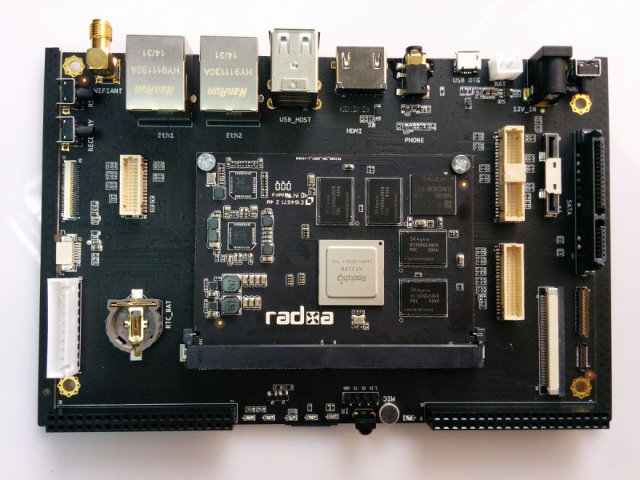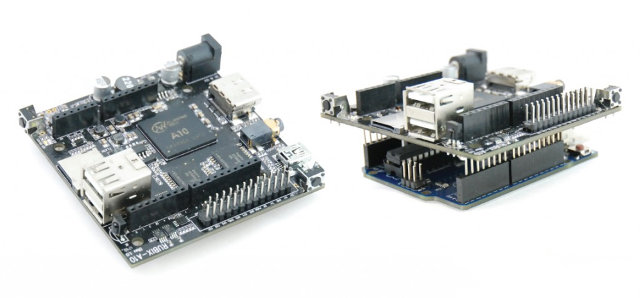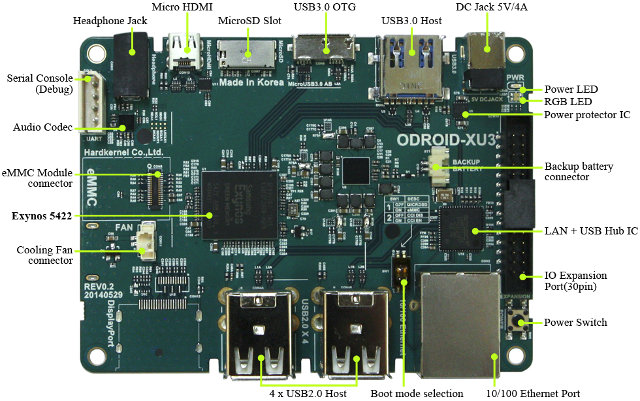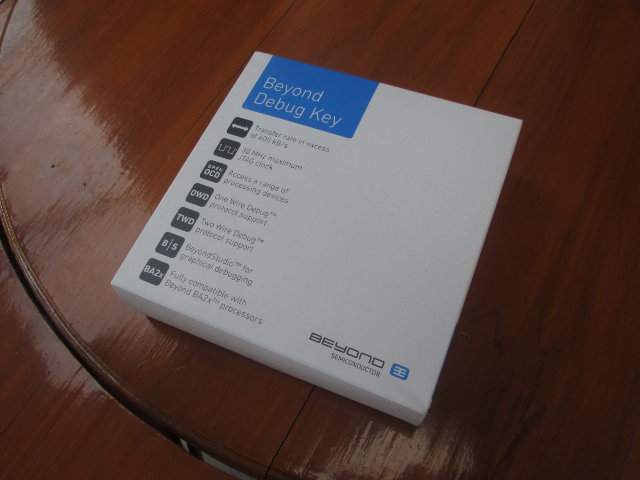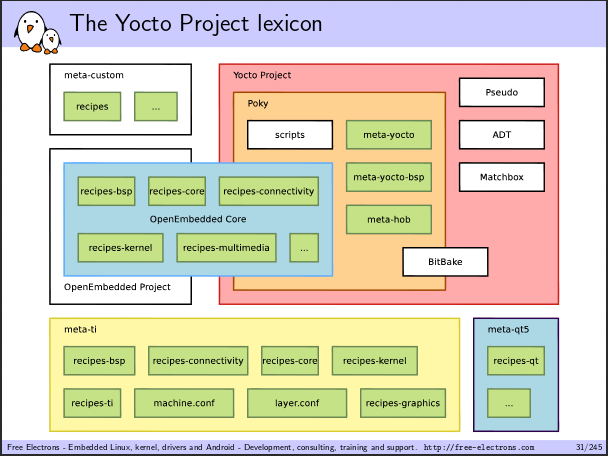Radxa Rock 2 is an upcoming development board based on Rockchip RK3288 quad core Cortex A12/A17 processor, which will run Android, and I would expect it to have better support for Linux desktop distributions than the original Radxa Rock board thanks to the current work done by Rockchip and Google on Chromium OS, which could bring 2D/3D graphics, and hardware video decoding to the platform. The board is not available for purchase yet, but pictures have been published, and specifications released. So the new board is comprised of a baseboard and a system-on-module (SoM), which should help Radxa’s customers design their own products, while using Radxa SoM, and doing early development on Radxa Rock 2 board. Radxa SoM specifications: SoC – Rockchip RK3288 quad core ARM Cortex-A17 processor@1.8Ghz with ARM Mali-T764 GPU with support for OpenGL ES1.1/2.0/3.0, OpenCL 1.1, DirectX 11 System memory – 2GB (4GB optional), 64bit DDR3@800Mhz Storage […]
Android 5.0 Lollipop Source Code Pushed to AOSP
As Nexus 6 smartphone, Nexus 6 tablet, and Nexus Player have now started to ship, Google has pushed Android Lollipop to AOSP (Android Open Source Project), as well as images for Nexus 4, Nexus 5, Nexus 7 (2012 and 2013), and Nexus 10. You’ll soon be able to retrieve the source code with the following command lines [Update: I still can’t use the lollipop-release branch to retrieve the code, so instead you can use android-5.0.0_r1 tag for Nexus 9, or android-5.0.0_r2 tag for Nexus Player / Android TV]: repo init -u https://android.googlesource.com/platform/manifest -b android-5.0.0_r1 repo sync Currently repo init fails with: error: in init -u https://android.googlesource.com/platform/manifest -b lollipop-release –repo-url=https://gerrit.googlesource.com/git-repo –repo-branch=stable: revision lollipop-release in manifests not found But everything should come online soon. In the meantime, you could still browse the code. Anyway that means Android 5.0 images for mini PCs, TV boxes and other devices will hopefully be available in […]
Rubix A10 is an Arduino Shield Running Linux Powered by Allwinner A10 Processor
There are plenty of ARM Linux boards featuring Arduino compatible headers such as UDOO, PcDuino, ATSAMA5D3 Xplained, etc…, and Rubix A10 looks like one of these boards, as it comes with an Allwinner A10 processor, boast Arduino compatible header, and runs Linux or Android, but instead of simply accepting Arduino shields, Rubix A10 can be used as a shield itself for Arduino (UNO?)boards. Rubix A10 specifications: SoC – Allwinner A10 ARM Cortex A8 processor @ 1.0 Ghz with Mali-400 GPU System Memory – 1GB DDR3 Storage – 4 to 8 GB MLC 64-bit ECC NAND Flash, micro SD slot up to 128 GB Video Output – HDMI 1.4 up to 1080p60 Audio I/O – HDMI, 3.5 mm jack for MIC + headphone. Connectivity – 802.11b/g/n Wi-Fi up to 150Mbps, USB – 2x USB 2.0 host interfaces, 1x mini USB OTG 2.0 port Expansions Headers Arduino compatible headers 26-pin Raspberry Pi […]
$99 ODROID-XU3 Lite Development Board Powered by Exynos 5422 Octa Core Processor
Hardkernel is known for their low cost Exynos based ODROID boards such as the $59 ODROID U3 board based on Exynos 4412 quad core SoC, and with ODROID-XU3, they also have a more powerful Octa-core Exynos 5422 board which sells for a premium price of $179. The company has now decided to offer a cheaper version of the board, which they call “ODROID-XU3 Lite” and lacks DisplayPort, the current and voltage sensors, and uses an Exynos 5422 processor clocked at 1.8/1.3 GHz instead of 2.0+/1.4 GHz for the original board. Price? A cool $99. ODROID-XU3 Lite specifications: SoC – Samsung Exynos 5422 quad core ARM Cortex-A15 @ 1.8GHz quad core ARM Cortex-A7 @ 1.3GHz in big.LITTLE configuration with Mali-T628 MP6 GPU supporting OpenGL ES 3.0 / 2.0 / 1.1 and OpenCL 1.1 Full profile System Memory – 2GB LPDDR3 RAM PoP (933Mhz, 14.9GB/s memory bandwidth, 2x32bit bus) Storage – Micro […]
Beyond Debug Key Enables JTAG & UART Debugging, Supports OpenOCD
Beyond Semiconductor, a fabless semiconductor company based in Slovenia which develops their own 32-bit BA2x IP cores, has sent me one of their development tool, namely Beyond Debug Key supporting JTAG and UART interfaces either with BeyondStudio for the company’s BA2x processor, or the open source suite OpenOCD for other processors. Since I don’t have any Beyond Semi boards, I instead configured it, and quickly tried it with Atmel SAMA5D3 Xplained ARM Cortex A5 development board, and OpenOCD (Open On-Chip Debugger). The debug tool comes in the package above describing the key features of the kit: Performance Transfer rate in excess of 600 kB/s 30 MHz maximum JTAG clock Less than 20 μW power draw from target board Compatibility Fully compatible with Beyond BA2x processor family Access any 8-bit, 16-bit, 32-bit or 64-bit processors via JTAG Works with all JTAG compliant devices Software Support OpenOCD for access to a range […]
Free Electrons Publishes Yocto & OpenEmbedded Training Materials
Free Electrons is a small (9 people) engineering company focusing on embedded Linux / Android, and open source software, which also happens to have ported several ARM SoC to the mainline kernel. From time to time, they also offer training sessions, and release course materials publicly. Their latest training is a 3-day course dealing with the Yocto Project and OpenEmbedded, using BeagbleBone Black development board for lab sessions, and all materials have been released under a Creative Commons license. The training consists in: Understanding the Yocto Project Using it to build a root filesystem and run it on your target Writing and extending recipes Creating layers Integrating your board in a BSP Creating custom images Application development with an Eclipse SDK Three files are released: yocto-slides.pdf – Yocto Project and OpenEmbedded Training presentation slides (245 pages) give an overview of various build systems, before getting more details about the Yocto […]
Linaro 14.10 Release with Kernel 3.17 and Android 4.4.4, Debian ARM64 Port Almost Complete
Linaro 14.10 has just been released with Linux kernel 3.17 (baseline), Linux 3.10.54 & 3.14.19 (LSK, same versions as last month), and Android 4.4.2 & 4.4.4. Most of the work is a continuation of previous months working member hardware, and ARM64, but one particularly interesting point is that 90% of Debian packages have been built for ARM64, and the next version of Debian should have an official ARM64 port. Here are the highlights of this release: Linux Linaro 3.17-2014.10 updated linaro-android topic. In particular, CONFIG_IPV6=y is no longer the requirement for linux-linaro tree builds GATOR version 5.19 (same version as in 2014.08 release). gatord is fixed to build for ARMv8. dropped multi_pmu_v2 topic by ARM LT (no longer used) updated topic from Qualcomm LT (include IFC6410 board support) replaced integration-linaro-vexpress topic by integration-linaro-vexpress64. Starting from 2014.10 release, linux-linaro kernel tree will use the mainline support for 32-bit vexpress boards. integration-linaro-vexpress64 […]
Banana Pro Allwinner A20 Development Board Looks Similar to Raspberry Pi Model B+
Banana Pi development board was launched about half year ago with Raspberry Pi model B form factor, but with more powerful Allwinner A20 dual core processor, and extra interfaces such as SATA. A few months later, the Raspberry Pi foundation launched Raspberry Pi Model B+ with pretty much the same specifications, but a different board layout and connector placement, and LeMaker has now designed a new version of the AllWinner A20 development board called “Banana Pro” that’s somewhat similar to R-Pi B+ board layout, with a 40-pin header, and similar connector placement, minus a few differences, such as using two USB ports instead of four, and the addition of a Wi-Fi module. Banana Pro specifications with differences against Banana Pi highlighted in bold: SoC- Allwinner A20 dual core Cortex A7 processor @ 1 GHz with Mali-400MP2 GPU System Memory – 1 GB DDR3 Storage – micro SD card slot, SATA […]


